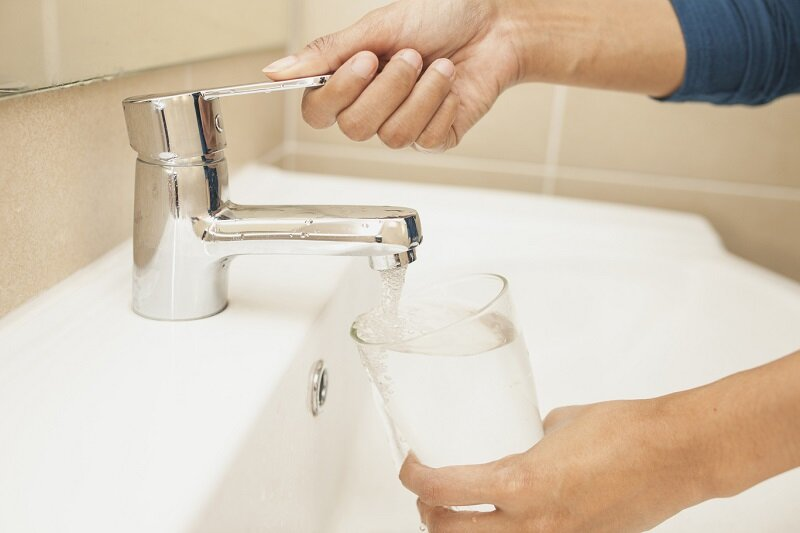Have you ever wondered if it’s safe to drink bathroom tap water at night? Maybe your partner grabs a quick sip from the bathroom sink, too tired or too lazy to head to the kitchen. While it may seem like all tap water is the same, the reality can be more complicated. This article explores the potential risks of drinking bathroom tap water and offers tips to ensure the water you consume is safe and clean.
Why You Should Think Twice About Drinking Bathroom Tap Water

It’s easy to assume that tap water is safe from any faucet, but there are several factors that can make bathroom tap water less ideal for drinking. From the potential for bacteria buildup to differences in filtration, it’s worth understanding what might make bathroom water different from kitchen tap water.
1. Stagnant Water and Potential Contaminants
Bathroom taps often aren’t used as frequently as kitchen taps, which means water can sit in the pipes for extended periods. Stagnant water is a breeding ground for bacteria and other contaminants. When water stays in pipes for too long, it can pick up substances such as lead, copper, or even bacteria like Legionella, which thrive in stagnant water and warm environments.
Furthermore, bathroom plumbing is often smaller in diameter than kitchen plumbing, which can exacerbate the issue of stagnant water. The less water moves through these pipes, the more time contaminants have to accumulate, potentially making that late-night drink a little riskier.
2. Difference in Filtration Systems
In many homes, only the kitchen tap has a direct connection to a filtration system or water softener. Filters are usually installed in the kitchen to ensure the water used for cooking and drinking is free from impurities, but bathrooms typically don’t have the same setup. As a result, bathroom water may contain more minerals, metals, or other impurities that are otherwise filtered out in the kitchen.
If your kitchen water has a filtration system, you might not realize how much cleaner it is compared to your bathroom tap. Without a filtration system, bathroom water can contain higher levels of chlorine, sediment, and other substances that you might prefer to avoid drinking.
3. Older Fixtures and Maintenance Issues
Bathrooms, especially in older homes, may not receive the same level of maintenance as kitchens. This means the faucets, pipes, and plumbing may be outdated, contributing to a lower quality of water. Aging pipes can corrode over time, potentially introducing lead or other harmful metals into the water supply. This is particularly concerning in bathrooms where plumbing might be overlooked for maintenance or upgrades.
If the bathroom fixtures are older, they may also have mineral deposits or residue buildup, which could impact the water quality. Moreover, certain types of plumbing materials are known to leach chemicals into the water, especially if they haven’t been maintained or replaced in decades.
4. Increased Risk of Exposure to Chemicals
Most people store cleaning products like bleach, disinfectants, and other chemicals in the bathroom. These can leave residues on the faucets or even in the sink area. When you fill a glass from the bathroom tap, there’s a possibility of coming into contact with these residues. Additionally, some households may use chemicals specifically to keep bathroom plumbing free from blockages, which could potentially affect the water quality if not rinsed thoroughly.
It’s also worth noting that soap, toothpaste, and other bathroom products might interact with water surfaces, leading to a subtle buildup that, while not immediately dangerous, might not be the cleanest source for your drinking water.
Steps to Ensure Your Bathroom Tap Water Is Safe

If you or your partner habitually drink from the bathroom tap at night, there are ways to make it safer. While some may involve a small upfront cost, the peace of mind and improved health benefits are well worth it.
a) Test the Water Quality Regularly
One of the best ways to ensure your bathroom tap water is safe is by regularly testing it. Water test kits are affordable and easy to use, providing quick insights into the presence of contaminants such as lead, bacteria, and other potential hazards. Testing the water can also help you decide if additional filtration is needed or if maintenance on the plumbing is required.
b) Consider Installing a Faucet Filter
A small faucet filter can be a simple solution to improve the quality of your bathroom tap water. Many compact filters are designed to fit easily onto bathroom faucets and can filter out common impurities. While these filters may not offer as comprehensive filtration as larger kitchen systems, they can help reduce chlorine, lead, and other metals.
c) Keep a Water Bottle by Your Bed
The easiest solution may simply be to bring a bottle of filtered water from the kitchen before you go to bed. Not only is this a quick way to avoid the potential risks of bathroom water, but it also ensures you have clean, accessible water right at your bedside. A reusable water bottle can be filled each evening, giving you peace of mind knowing you’re drinking the same filtered water you use during the day.
d) Schedule Regular Plumbing Maintenance

Ensuring your bathroom plumbing is in good condition can make a big difference. Periodic maintenance checks help detect any corrosion, leaks, or buildup of contaminants in the pipes. A plumber can assess the condition of your bathroom fixtures, replace any outdated pipes, and make sure your water supply is safe.
Final Thoughts on Drinking Bathroom Tap Water
While it might seem harmless to drink from the bathroom tap at night, understanding the potential risks can help you make an informed decision. Although the convenience is tempting, taking a few precautionary steps can significantly reduce your exposure to harmful substances and contaminants. Whether it’s installing a small filter, keeping a water bottle by your bedside, or scheduling regular plumbing maintenance, there are plenty of ways to ensure your drinking water is safe.
Ultimately, while the risk might not be high, being mindful about your water source is a healthy habit. After all, the quality of water you consume plays a direct role in your overall well-being. So, before you grab that next sip from the bathroom tap, consider taking a moment to think about these factors — your health might thank you for it.


